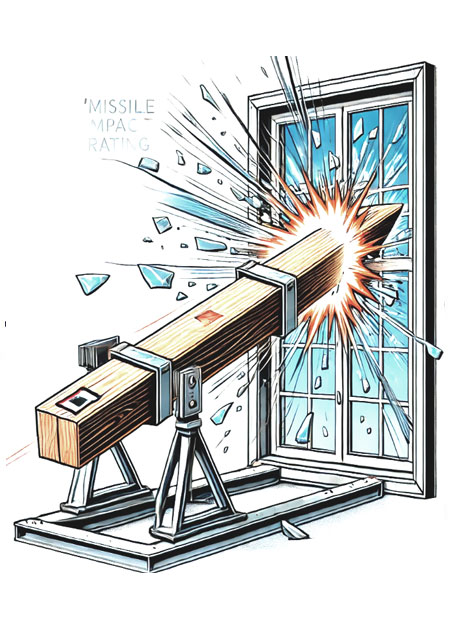
The information on this page was last updated on March 21, 2025
What is the Missile Level Impact Rating?
The Missile Level Impact Rating refers to a classification system that measures the ability of building materials, such as windows and doors, to resist impacts from wind-borne debris during a hurricane. The term "missile" in this context does not refer to military weaponry but to any object that could be carried by strong winds and potentially cause significant damage upon impact.
Historical Context
The implementation of the Missile Level Impact Rating can be traced back to the aftermath of Hurricane Andrew in 1992. This Category 5 hurricane caused extensive damage throughout South Florida, leading to a complete overhaul of building codes in the region. The devastation highlighted the need for stronger, more resilient structures capable of withstanding severe weather conditions.
Classification Levels
The rating system is divided into several levels, each indicating a different degree of impact resistance. The two primary categories are Large Missile Impact and Small Missile Impact:
Testing and Certification
To achieve a Missile Level Impact Rating, building products must undergo rigorous testing. This process is typically conducted by certified laboratories using specialized equipment to simulate the conditions of a hurricane. The testing involves repeatedly launching projectiles at the product to ensure it can withstand multiple impacts without failing.
Products that pass these tests are then certified and listed by organizations such as the Miami-Dade County Product Control Section. This certification is crucial for manufacturers and builders, as it signifies that their products meet the highest standards of impact resistance.
Importance for Homeowners and Builders
For homeowners and builders in Miami-Dade County, adhering to these standards is not just a matter of compliance but a critical aspect of safety. Buildings constructed or retrofitted with materials that meet the Missile Level Impact Rating are far more likely to withstand the forces of a hurricane, reducing the risk of structural damage and injury.
Economic and Insurance Implications
Complying with the Missile Level Impact Rating also has significant economic and insurance benefits. Homes and buildings that meet these standards are often eligible for reduced insurance premiums due to the decreased risk of damage. Additionally, investing in impact-resistant materials can increase property values and provide peace of mind to homeowners.
Future Developments
As climate change continues to influence weather patterns, the importance of stringent building codes and impact resistance standards is likely to grow. Miami-Dade County remains at the forefront of this effort, continuously updating and refining its building codes to ensure they address emerging threats and incorporate the latest advancements in building materials and technology.
CGI Windows and Doors, Inc. Large Missile Testing
Top Ten Questions About Impact Windows
Fill out the form below or call (561) 422-4935 to receive your free in-home estimate.